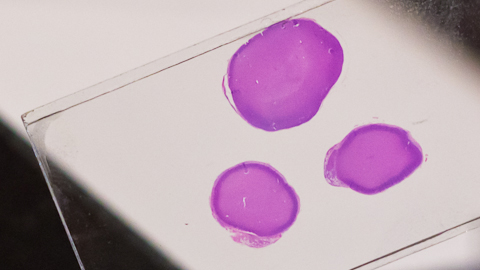New Experimental Drug Blocks One of the Most Notorious Cancer Drivers
A research group from the Turku Centre for Biotechnology has found a novel way of how to inhibit a particularly vicious activity of one of the most notorious cancer drivers: the oncoprotein Ras.

Currently, cancer researchers and drug developers around the world hunt for a drug against one of the most notorious cancer drivers: the oncoprotein Ras.
‒ It was once considered impossible to find drugs against Ras. However, spurred by the Ras initiative of the National Cancer Institute (NCI, USA), the current view has dramatically changed. Recent experimental drug development success stories suggest that after all the ‘holy grail’ of cancer research ‒ the development of a Ras directed drug ‒ could finally be achieved, explains Phd Daniel Abankwa, leader of the research group and Docent at Åbo Akademi University.
The research group at the Turku Centre for Biotechnology, a joint department of the University of Turku and Åbo Akademi University, has now made another important contribution in Ras drug development. They found a novel way of how to inhibit a particularly vicious activity of the most notorious Ras version, called K-ras. Their experimental drugs specifically block the activity of K-ras to support so called ‘cancer stem cells’, which are the actual cells that can seed a tumor.
‒ Tumor seeding is what happens when the cancer spreads throughout the body, during metastisation, a late-stage development that typically leads to a fatal outcome. Thus blocking K-ras dramatically reduces tumor growth and formation, Dr. Abankwa says.
Together with the research group of Professor Tero Aittokallio from the University of Turku and Institute for Molecular Medicine Finland (FIMM), Dr. Abankwa’s group also identified a set of genes that could help to identify the patient population that might benefit most from treatments that can be developed based on their research; an example of a so-called personalised medicine approach. Intriguingly, the results suggest a particular relevance of their experimental drugs for cancers of women, such as breast, ovarian and uterine.
‒ Our study shows that pharmacological interference with oncogene K-ras hinders the growth of the cancer stem cells, which hopefully benefits patients. Our efforts tie nicely into the national task of Turku Universities in establishing drug development and diagnostics as a strategic focus area. We may end up getting really close to the Holy Grail of cancer research right here in Turku, Dr. Abankwa says.
MR